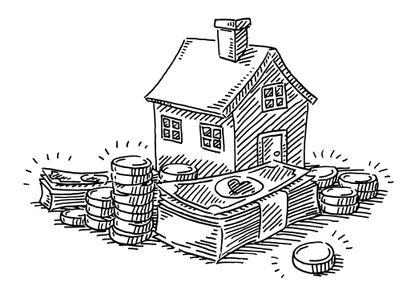Equity release mortgage: is it the right option for you?
What is an equity release mortgage and how does it work? We explain all you need to know


Equity release is when you release equity (a lump sum) or several small amounts of equity from your home – or a combination of the two - whilst still living in your home. You have to be 55 years of age or over and already paid off most of your existing mortgage on your home.
Taking out an equity release has become increasingly popular over the years due to the steep rise in UK house prices – which means the over 55s are able to release more equity from their home.
One of the UK’s largest mortgage lenders, Halifax said in May that there was a 1.3% jump in the cost of a home, taking the average selling price to a record £261,743. The UK’s leading equity release adviser Key found that in the first quarter of 2021, 10,341 new equity release plans were taken out by the over 55s, equivalent to £1.07 billion.
(MORE: Mortgages for the over 50s)
Types of equity release mortgage
There are two different types of equity release mortgage – a lifetime mortgage or a home reversion plan.
A lifetime mortgage is when you borrow money secured against the value of your home, your primary residence, usually between 18% or 50% of the property’s total value. The equity release product can either be an interest-paying mortgage or an interest roll-up mortgage.
- An interest-paying mortgage. This is when you get a lump sum and make monthly payments. This can prevent interest accumulating on the loan. Some lifetime mortgage plans allow you to make capital repayments. The amount you borrowed is repaid when your property is sold at the end of the mortgage term.
- An interest roll-up mortgage. This is when you get a lump sum, or you are paid a regular amount. Interest is then added to the loan. You don’t have to make regular payments. At the end of the mortgage term the amount you borrowed and the interest which has accumulated or “rolled up” is repaid once your home is sold.
The other type of equity release is a home reversion plan. This is when you sell all or part of your home at less than its market value in return for a tax-free lump sum, a regular income or both. You then stay on in your own home as a tenant, but you don’t pay any rent.
Look After My Bills Newsletter
Get the best money-saving tips, tricks and deals sent straight to your inbox every week. Make sense of your money in partnership with The Money Edit.
Home reversion plans are considered to be more high-risk compared to a lifetime mortgage.
Why might I want an equity release mortgage?
Most people over 55 years of age, consider releasing equity from their home to help friends and family, pay for long-term care or for a steady income in retirement. Other reasons for equity release include home improvements, university fees, deposit for a first home, holidays.
There are no hard and fast rules what to do with your equity release money. However, whatever the reasons, it is important to get financial advice before taking out equity release.
Who should take out an equity release mortgage?
Taking out equity release really depends on your circumstances as it is a big financial commitment. So, you need to ask yourself several questions before doing so.
For instance, would it be more sensible to downsize rather than take on a new financial commitment? Do you already have enough money for retirement without taking out equity release? Are you happy reducing your family’s inheritance (if you have beneficiaries) by taking out equity release?
What are the pros and cons of an equity release mortgage?
Pros
- You have peace of mind that you can stay in your home for life
- Flexibility. You can choose to pay off the loan early
- You don’t have to make any repayments until you enter long-term care or die, however there are options to make payments against the interest and the loan
- Some lifetime mortgages have a ‘No Negative Equity’ guarantee so you never owe more than your home is worth
- Equity release can reduce the value of your estate. This can be helpful if you want to reduce your inheritance tax liability
Cons
- Your legacy to your family (and beneficiaries) might be affected, and you will leave less to your children or grandchildren
- There are upfront costs which can be anywhere between £2,000 to £3,000 involving fees for financial advice, valuation fees, legal fees, a mortgage arrangement fee
- The interest on a lifetime mortgage can ‘roll-up’
- There may be an Early Repayment Charge (ERC) if you choose to repay all or part of the loan early
- The cash you release from your home can affect your entitlement to means-tested state benefits
Sabuhi is a freelance journalist. She has written about finance for national newspapers, media agencies, and finance-related websites.
With two decades of experience, she has contributed to the FT, Times online, Yahoo Finance, ITN On, Guardian, Express, Daily Mail, Mail on Sunday, Independent, Independent on Sunday, and inews.
She specialises in writing about insurance, mortgages and banking.
-
 Three energy firms pay £8m in switching compensation - has your provider paid out?
Three energy firms pay £8m in switching compensation - has your provider paid out?More than 100,000 customers have received compensation after changing providers, but is now a good time to switch energy suppliers?
By Tom Higgins Published
-
 Save £300 on your supermarket shop with cashback accounts
Save £300 on your supermarket shop with cashback accountsBanks, credit card companies and cashback sites are all offering cashback on your supermarket shop, but can you use them all to max out your savings?
By Vaishali Varu Published
-
 Moving home: why failing to share your new address could cost you money
Moving home: why failing to share your new address could cost you moneyWhen you move home you’ll want to share your new address with family and friends – but being slow to update your contact details with councils, banks and the DVLA can be costly
By Sue Hayward Published
-
 Skipton Building Society to offer deposit-free mortgages for “trapped renters” - everything you need to know about 100% deals
Skipton Building Society to offer deposit-free mortgages for “trapped renters” - everything you need to know about 100% dealsEverything you need to know about how to get a mortgage with no deposit
By Katie Binns Published
-
 Stamp duty: are you entitled to a tax refund worth thousands?
Stamp duty: are you entitled to a tax refund worth thousands?There are plenty of reasons why homebuyers may be entitled to a stamp duty refund, but it’s important to only claim if you’re eligible for a refund (and beware the claims management companies)
By John Fitzsimons Published
-
 House price hotspots: 50 areas where property prices have shot up the most
House price hotspots: 50 areas where property prices have shot up the mostWhich areas have seen the strongest house price growth over the past decade? Discover the towns and locations around the UK where property prices have more than doubled.
By John Fitzsimons Published
-
 Faster mortgage support for Universal Credit claimants – what it means for you
Faster mortgage support for Universal Credit claimants – what it means for youIf you claim Universal Credit, you can now get quicker support with paying your mortgage. We look at when you can get it and how to access it
By Stephanie Baxter Published
-
 Should I fix my mortgage rate?
Should I fix my mortgage rate?Interest rates are expected to rise again on the back of stubborn inflation, before falling next year. We look at the pros and cons of fixing your mortgage rate and what to consider if you need to remortgage soon.
By Stephanie Baxter Last updated
-
 Selling your home: avoid these mistakes to get the best possible price
Selling your home: avoid these mistakes to get the best possible priceFrom boosting kerb appeal to clearing clutter, there are crucial steps to take to ensure you get the highest price when selling your home
By John Fitzsimons Last updated
-
 Interest rates rise to 4.25% - what does it mean for your money?
Interest rates rise to 4.25% - what does it mean for your money?The Bank of England has increased the base rate for the 11th time in a row. We look at whether rates could rise further this year, and what the latest hike means for your mortgage and savings
By Ruth Emery Published